
HSC Center for Older Adults: 2023-25 Addressing Depression in the Context of Age-Friendly Care
Major depressive disorder comes under the "M" of Mentation of the Age-Friendly Health System model. This activity will discuss suicidal epidemiology, assessment, and treatment for Major Depressive Disorder. Although we see a much higher focus on suicide in younger people in the lay media, men aged 65 and older constitute the highest rate per 100,000 population.
Primary care practices must be equipped to provide this care as there are not enough geriatricians to meet this need. A model was developed as a joint initiative of The John A. Harford Foundation and the Institute for Healthcare Improvement along with the American Hospital Association and the Catholic Health Association of the United States to guide any practice to deliver age-friendly care. The Age-Friendly Health System designation includes assessing and acting upon the 4M's of Age-Friendly care: What Matters, Mentation, Medication, and Mobility. This module focuses on areas under "Mentation".
Target Audience
This activity is intended for physicians, physician assistants, nurse practitioners, ambulatory clinic nurses, clinical pharmacists, social workers, psychologists, marriage and family therapists, and licensed professional counselors.
Learning Objectives
When you complete this module, you will be able to:
- Identify the epidemiology of suicidality, the most severe consequence of Major Depressive Disorder.
- Explain risk factors and protective factors for suicide risk assessment.
- Analyze evidence-based pharmacological treatments applicable to primary care settings.
- Examine alternative and emerging treatments for Major Depressive Disorder.
- Reflect on ways to integrate an interprofessional approach to treatment within the context of an Age-Friendly Healthcare System.
Funding
This project is supported by grant funding from the Health Resources and Services Administration (HRSA) of the U.S. Department of Health and Human Services (HHS) under grant number U1QHP28735. The contents are solely the responsibility of the authors and do not necessarily represent the official view of the Health Resources and Services Administration or the U.S. Department of Health and Human Services. No commercial support was received for this activity.
Disclosures
In accordance with the appropriate accrediting bodies, all planners, teachers, and authors with control over activity content are required to disclose to the provider any relevant financial relationships (those held by the person, currently or within the last 24 months) with ineligible interests. Accredited providers are required to provide this information to learners before the start of an activity. The University of North Texas Health Science Center at Fort Worth Division of Academic Innovation's office planning team nor the subject matter experts have anything to disclose.
Primary Contributors
Sandra Davis, MD
Assistant Professor
HSC Health and University of North Texas Health Science Center, Texas College of Osteopathic Medicine, Department of Internal Medicine and Geriatrics
Sarah Ross, DO
Associate Professor
HSC Health and University of North Texas Health Science Center, Texas College of Osteopathic Medicine, Department of Internal Medicine and Geriatrics
Adenike Atanda, PharmD, BCACP, CDE, CTTS
Assistant Professor and Residency Program Director, AmbCare
HSC Health and University of North Texas Health Science Center, System College of Pharmacy, Pharmacotherapy
Estelle Harris-Neufville, LCSW
Instructor
HSC Health and University of North Texas Health Science Center, Texas College of Osteopathic Medicine, Department of Internal Medicine and Geriatrics
Contributors and Reviewers
Vicki Cannon, RN, BSN
Chief Nursing Officer
HSC Health
Susan Torrance, RN
Clinical Quality Manager
HSC Health, University of North Texas Health Science Center
Andrew Harman
Associate Director HSC Health Quality Programs, Program Management
HSC Health, University of North Texas Health Science Center
Instructional Design
Brenda Wilson, MS, CHCP
Senior Instructional Designer
CE & Assessment Department, Division of Academic Innovation, University of North Texas Health Science Center
Accreditation Statements
 In support of improving patient care, The University of North Texas Health Science Center at Fort Worth is jointly accredited by the Accreditation Council for Continuing Medical Education (ACCME), the Accreditation Council for Pharmacy Education (ACPE), and the American Nurses Credentialing Center (ANCC), to provide continuing education for the healthcare team.
In support of improving patient care, The University of North Texas Health Science Center at Fort Worth is jointly accredited by the Accreditation Council for Continuing Medical Education (ACCME), the Accreditation Council for Pharmacy Education (ACPE), and the American Nurses Credentialing Center (ANCC), to provide continuing education for the healthcare team.
As a Jointly Accredited Organization, [Provider name] is approved to offer social work continuing education by the Association of Social Work Boards (ASWB) Approved Continuing Education (ACE) program. Organizations, not individual courses, are approved under this program. Regulatory boards are the final authority on courses accepted for continuing education credit.
American Osteopathic Association
The University of North Texas Health Science Center is accredited by the American Osteopathic Association to award continuing medical education to physicians.
National Board of Public Health Examiners
The University of North Texas Health Science Center is accredited by the National Board of Public Health Examiners' Certified Public Health recertification program.
Texas Administrative Code
The University of North Texas Health Science Center certifies this activity meets the requirements for continuing education for Texas-licensed Professional Counselors, psychologists, and Marriage and Family Therapists.
Designation Statements
Pharmacists
This knowledge-based activity has been assigned UAN JA0004637-0000-23-028-H01-P and will award 1 contact hour of continuing pharmacy education credit in states that recognize ACPE Providers.
Statements of participation will indicate hours and CEUs based on participation and will be issued online at the conclusion of the activity. Successful completion includes completing the activity, its accompanying evaluation and/or posttest (score 70% or higher) and requesting credit online at the conclusion of the activity. Credit will be uploaded to CPE Monitor, and participants may print a statement of credit or transcript from their NABP eprofile.
UNTHSC complies with the Accreditation Standards for Continuing Pharmacy Education.
Physicians
The University of North Texas Health Science Center has requested that the AOA Council on Continuing Medical Education approve this program for 1 hour of AOA Category 2A CME credits and will report CME and specialty credits commensurate with the extent of the physician's participation in the activity.
The University of North Texas Health Science Center designates this enduring material for a maximum of 1 AMA PRA Category 1.0 Credit(s)™. Physicians should only claim credit commensurate with the extent of their participation in the activity.
Nurses
This activity provides up to 1 contact hour.
Social Workers
Social workers completing this course receive 1 contact hour of continuing education credits.
Licensed Professional Counselors, Licensed Marriage and Family Therapists, and Psychologists
This activity provides 1 CEU credit.
Certificate of Attendance
The University of North Texas Health Science Center certifies this activity for 1 hour of participation.
Available Credit
- 1.00 ACPE Pharmacy
- 1.00 AMA PRA Category 1 Credit™
- 1.00 ANCC
- 1.00 AOA Category 2-B
- 1.00 ASWB Credit
- 1.00 Certified Public Health (CPH)
- 1.00 HSC Participation
Price
Required Hardware/software
Technical Requirements
This activity is best experienced using the most current browser (or one back) of Firefox, Chrome, Safari, Internet Explorer, or Microsoft Edge. For all activities featuring audio, you must have a sound card and speakers. To view graphic images and references that appear in separate "pop-up" windows, you must have JavaScript and session cookies enabled on your computer. Adobe Acrobat Reader may be required for certain activities.
Please contact [email protected] with any technical issues.

 Facebook
Facebook X
X LinkedIn
LinkedIn Forward
Forward